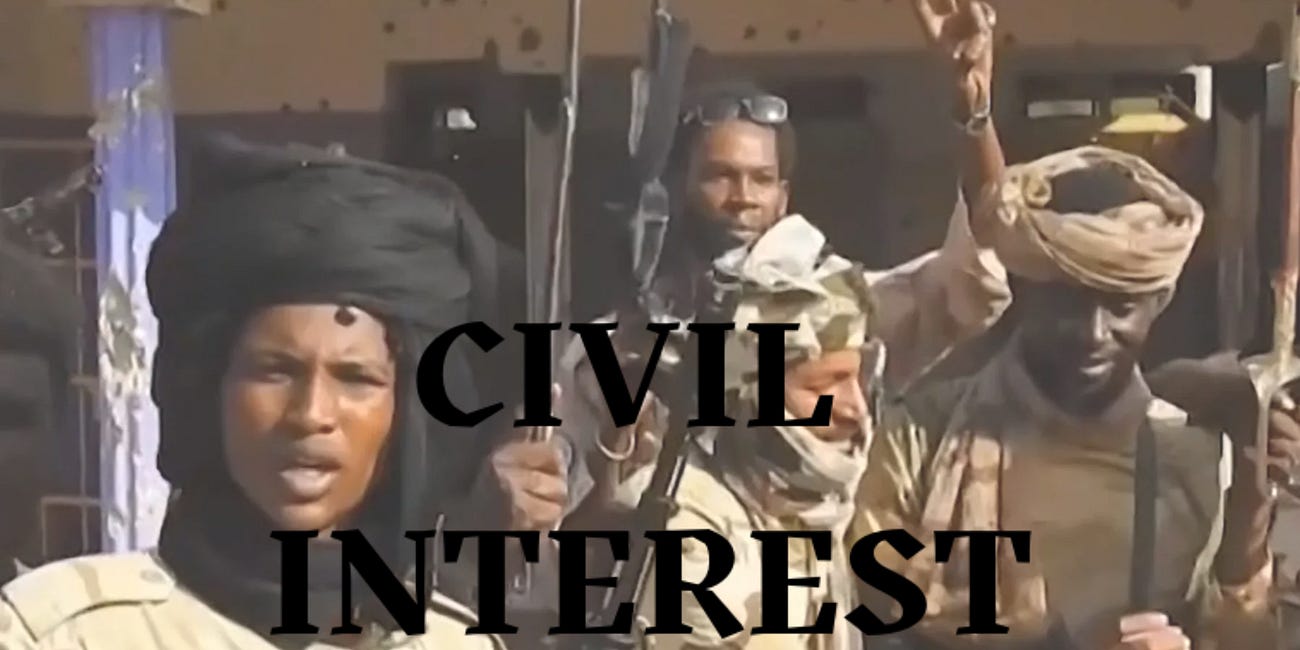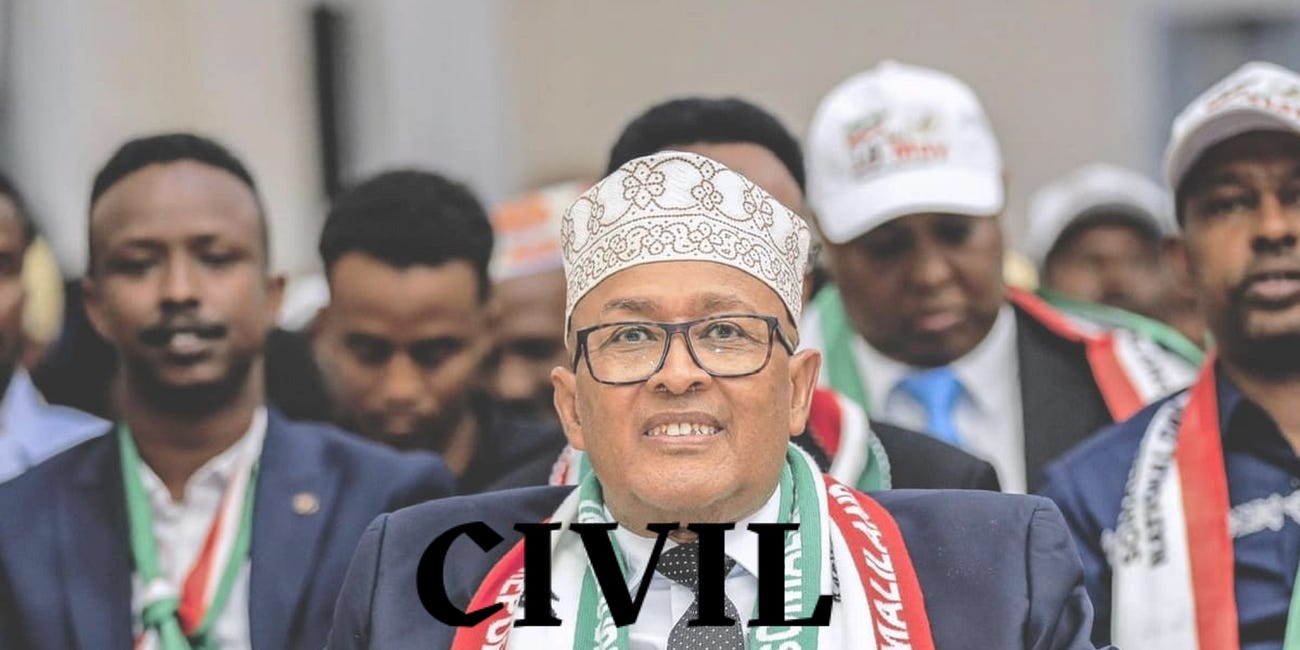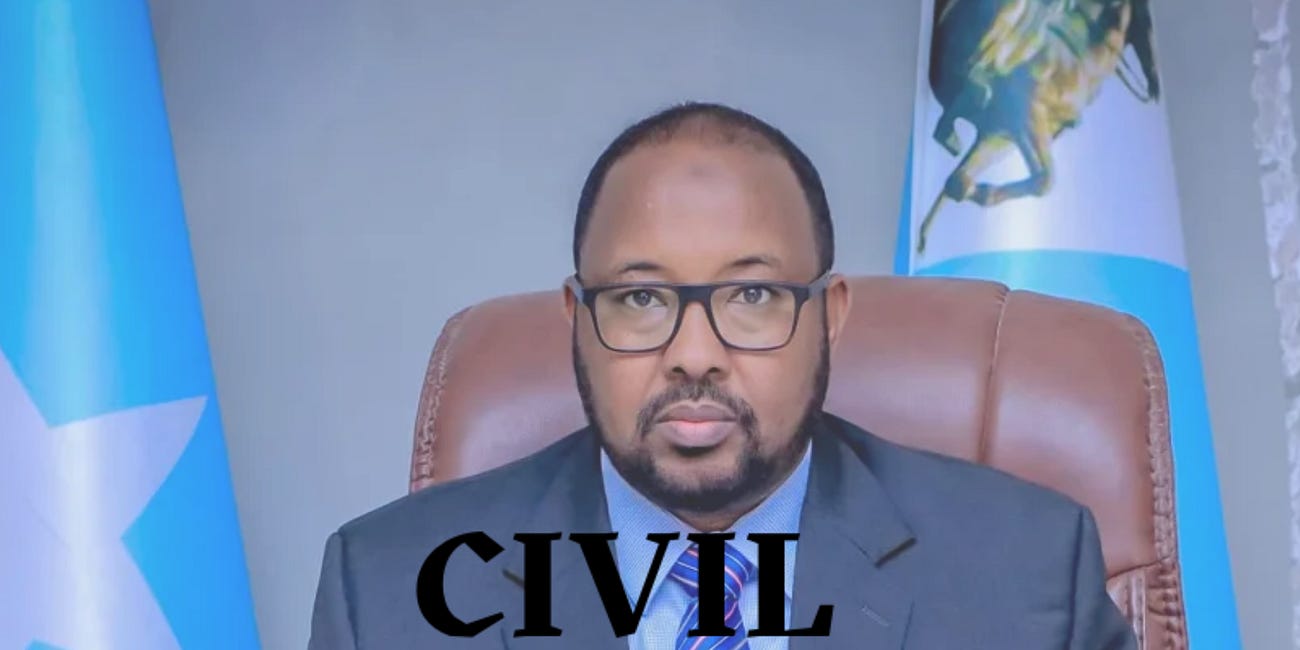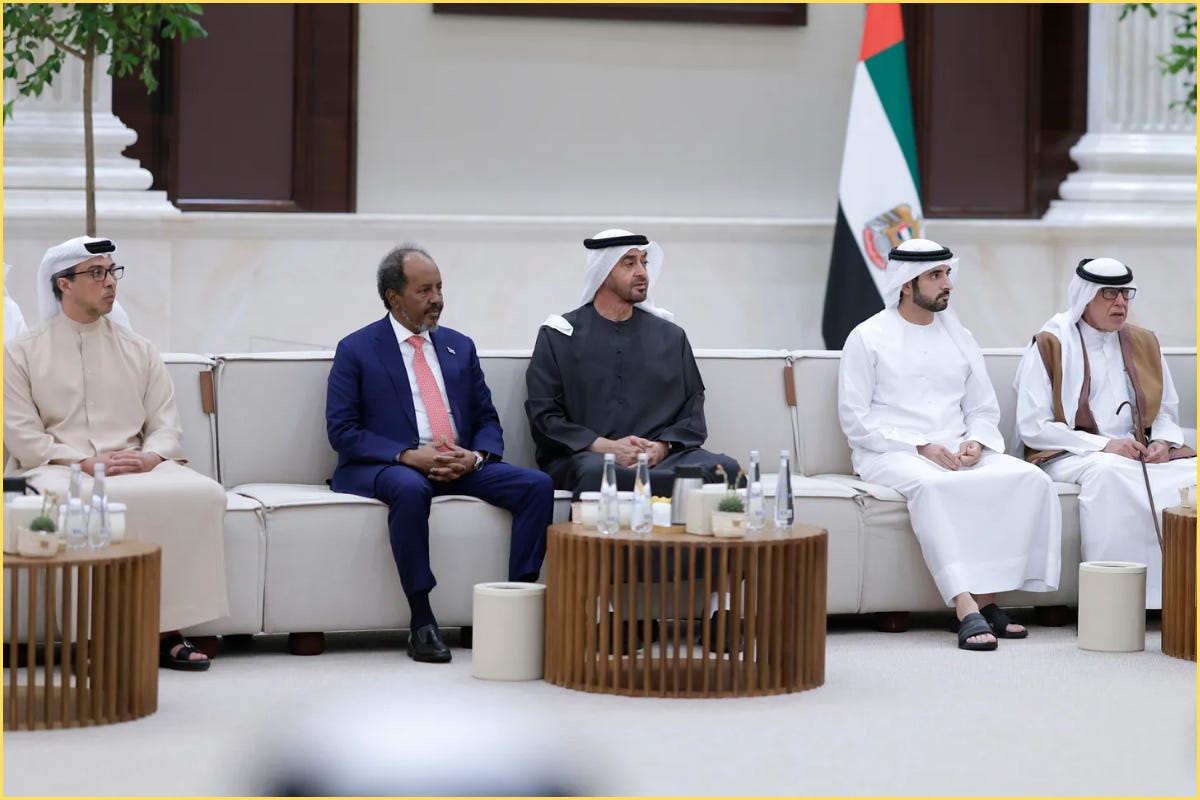the uae’s secret somali hub sustaining the rsf in sudan
the new empire isn’t built on colonies, but contracts. abu dhabi doesn’t conquer, it invests, arms, and collects.
In the early hours of October 29, an Ilyushin Il-76 with registration EX-76018, operated by the UAE-linked Kyrgyz shell Fly Sky Airlines, touched down at Bosaso International Airport after a 90-minute hop from Kufra, in eastern Libya. Flightradar24 and OSINT trackers logged the inbound leg at 10:17 UTC, by 14:30, it was wheels-up again, returning to Kufra.
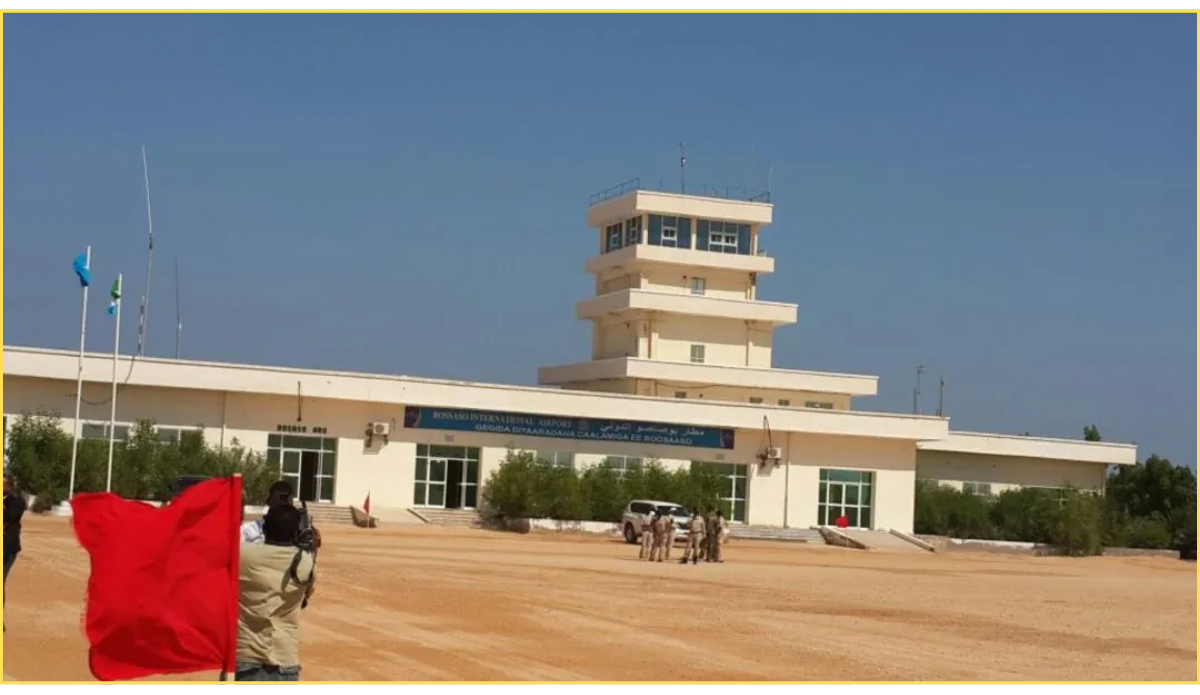
This wasn’t a one-off. EX-76018 ran over 20 Bosaso–Kufra loops in October alone, each carrying up to max 40 tons of weapons, drones, mercenaries and ammunition for the RSF in Darfur. The cargo enters Sudan overland from Kufra, just 200 km from the border via routes controlled by Khalifa Haftar, another UAE proxy.
In October, trackers had logged over 60 such flights. Il-76s and Boeing 747s shuttling between between UAE airfields, Bosaso in Puntland, and the Libyan hubs of Benghazi and Kufra. These weren’t commercial runs. They were the lifeline keeping Sudan’s Rapid Support Forces (RSF) armed and operational amid accusations of genocide in Darfur.
Sudan’s civil war, now in its third year, has claimed over 150,000 lives and displaced millions (the death toll is most likely far higher). The RSF, led by Mohamed Hamdan Dagalo (Hemedti), stands accused by the UN and human rights groups of ethnic cleansing in Darfur, targeting non-Arab communities like the Masalit with mass killings, rape, and forced displacement. The fall of El Fasher, after months of siege, marked a turning point. RSF forces overran the city, killing thousands in what survivors described as systematic atrocities.
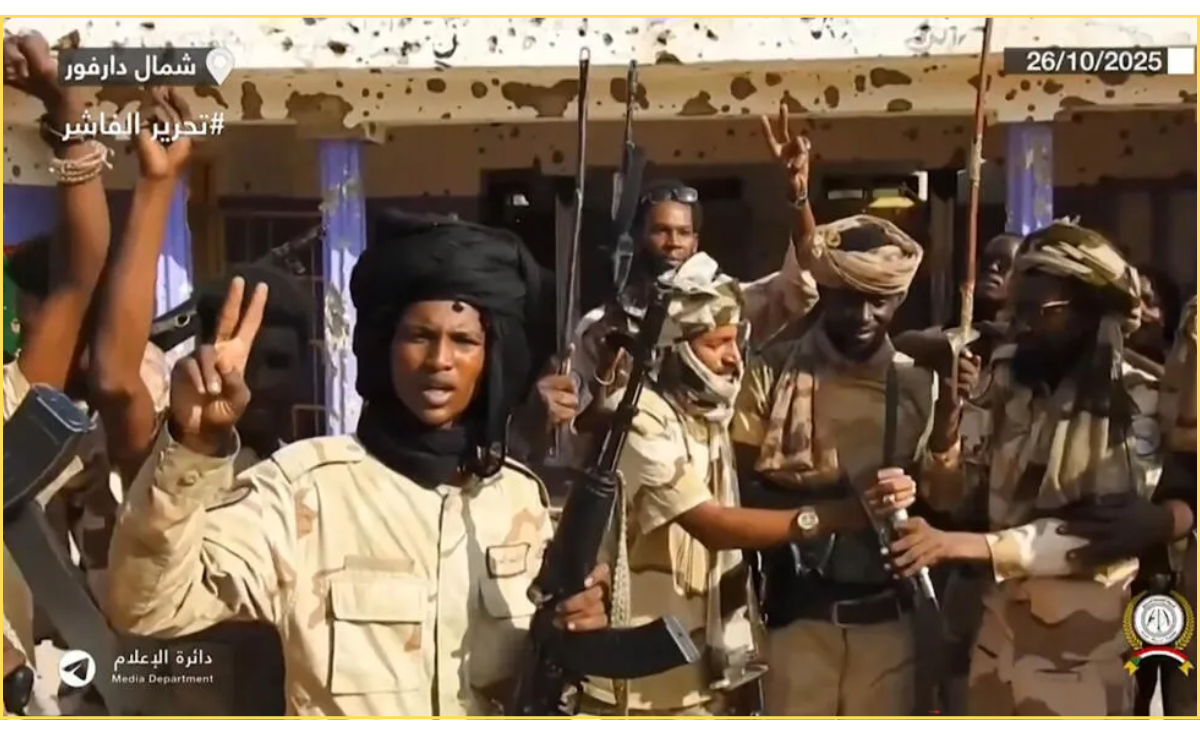
Even with international sanctions in place, the RSF continues to operate effectively thanks to a steady flow of supplies. Much of this support is widely believed to come from the UAE, which allegedly uses a complex network of partner groups and intermediaries across East and North Africa to move supplies indirectly and avoid direct accountability.
This isn’t a rogue operation. It’s a deliberate extension of Abu Dhabi’s foreign policy. Which is a imperialist strategy that uses economic leverage, private contractors, and semi-autonomous allies to project power without the mess of direct occupation. In Sudan, it means arming the RSF to secure influence over the country. The cost? A war that’s turned Sudan into a graveyard.
Who exactly are the RSF? Read this piece on who they are, their filmed cruelty and the warped faith driving their war:
"shayatin al-ard" — شياطين الأرض — devils of the earth
In El Fasher, the capital of North Darfur, the Rapid Support Forces have turned siege into ritual. Months of encirclement, starvation, and airstrikes have killed thousands. Satellite images from Yale…
building the pipeline
The UAE’s foothold in the Horn of Africa dates to 2010, when Abu Dhabi helped set up the Puntland Maritime Police Force (PMPF) in Bosaso to combat Somali piracy. What began as a maritime initiative has since evolved into a broader logistics footprint. By this year, open-source imagery and reporting revealed expanded aprons and fortified compounds at Bosaso, along with the installation of a high-performance radar system near the airport. Identified by multiple outlets as the Israeli-made EL/M‑2084. The radar was reportedly deployed through a confidential UAE-Puntland arrangement that bypassed Somalia’s federal government in Mogadishu. The EL/M‑2084 is a multi-mission system capable of detecting aircraft, drones, and missile trajectories at ranges of up to roughly 470 km, providing broad surveillance coverage of the Gulf of Aden, the Bab el-Mandeb strait, and Red Sea corridors. These are key arteries for both military and commercial traffic.
Puntland’s semi‑autonomous status makes it attractive for external patrons. Public reporting indicates President Said Abdullahi Deni relies on roughly $50 million in annual UAE funding for the PMPF, a force of several thousand that secures Bosaso’s airport and port (and fights “ISIS”). Emirati financing and concessions give Abu Dhabi significant leverage over these facilities.
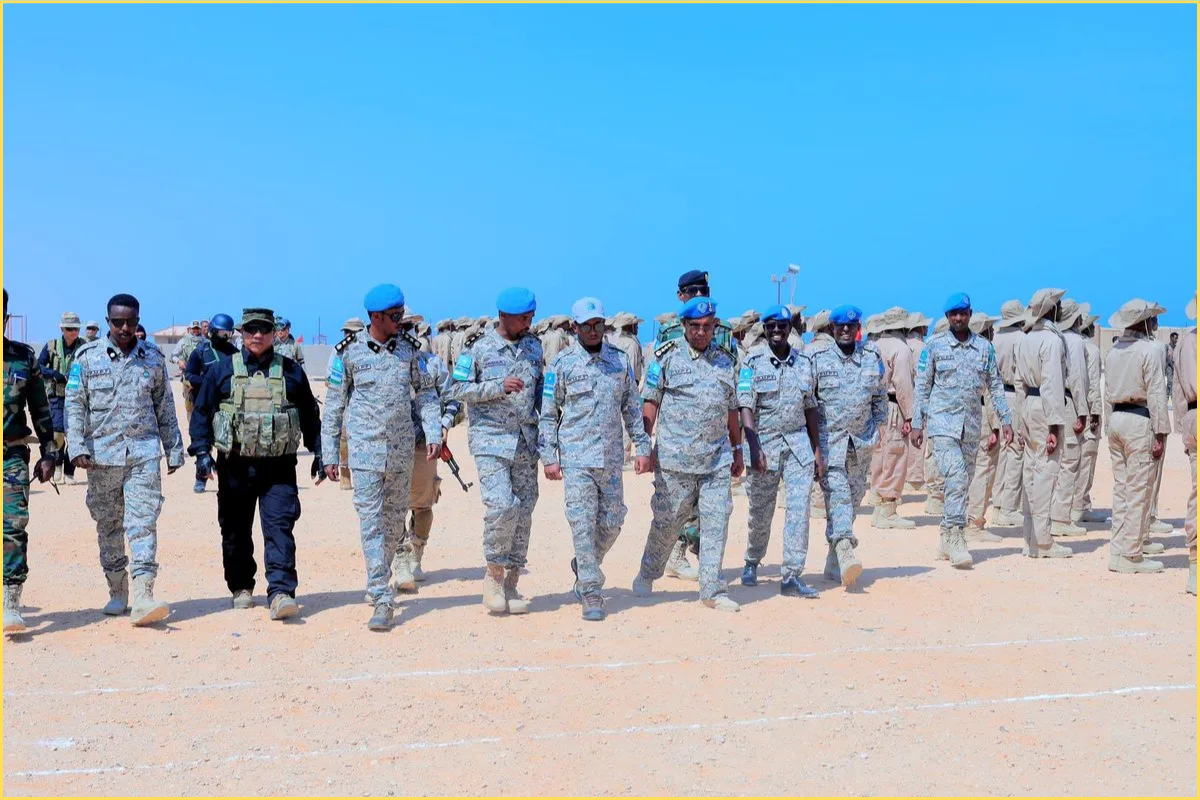
Dubai’s DP World, through its subsidiary P&O Ports, operates Bosaso Port under a 30‑year, $336 million concession signed in 2017. Next door stands the Bosaso International Airport, operated since January 2021 by the Emirati firm Bosaso International Airport Co. (BIAC), a subsidiary of Terminals Holding, whose majority shareholder is Abu Dhabi’s sovereign wealth fund ADQ, chaired by Tahnoon bin Zayed Al Nahyan. The site has drawn roughly $170 million in Emirati investment tied to a 2008 development agreement with Dubai’s Lootah Group. Between 2023 and 2024, the UAE military built a restricted compound within the airport perimeter, accessible only to its personnel, where drone hangars now support operations against ISIS‑Somalia in the Cal Miskaat Mountains. Also, The same compound doubles as a transit hub for hundreds of Colombian mercenaries recruited by UAE firms and flown straight to RSF frontlines in Darfur. The base remains active.
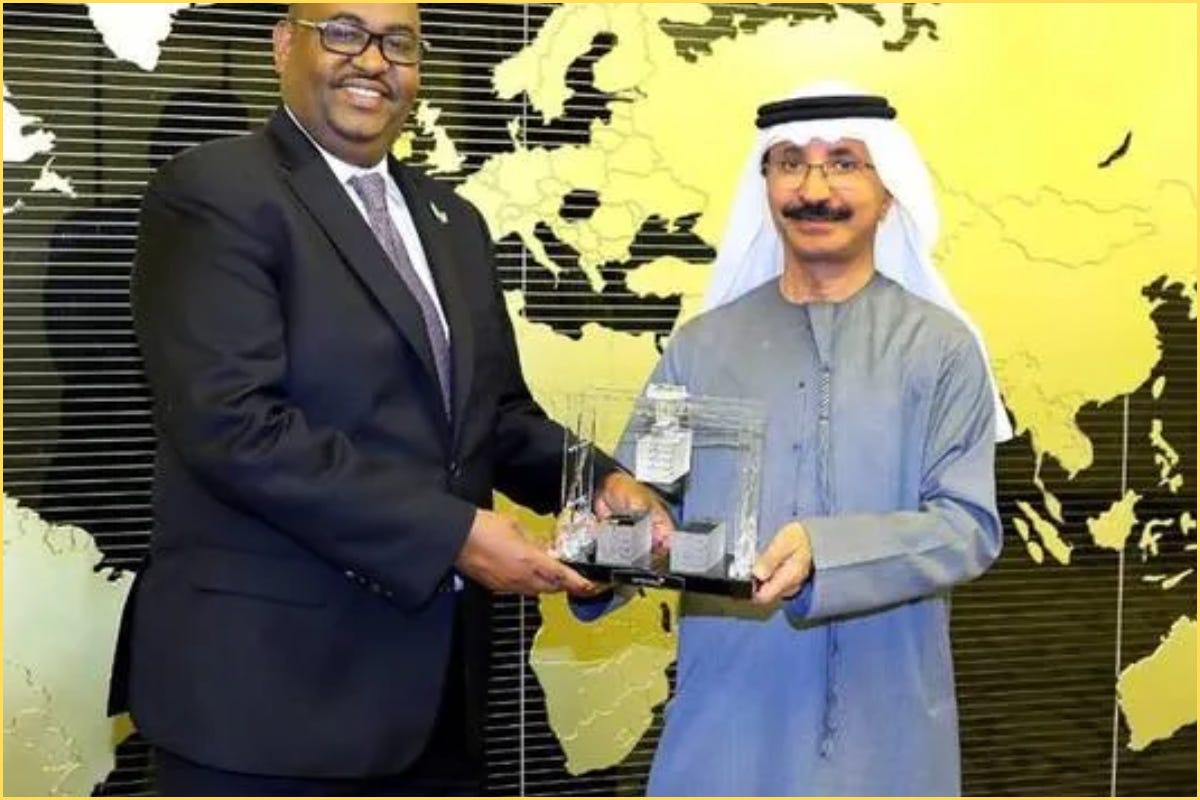
Taken together, these projects reflect hundreds of millions of dollars in Emirati‑backed infrastructure in Puntland, all part of a wider pattern of UAE investment across Somalia. A senior PMPF commander at Bosaso Airport who spoke to Middle East Eye described hearing the roar of heavy aircraft landing at night and seeing guarded offloads at the airport, along with operations under PMPF supervision with little to no customs oversight. He said such flights, once rare, have become routine, and that shipments are swiftly moved to restricted areas before departure. While he couldn’t confirm what the cargo contained, he believed the secrecy indicated foreign-bound logistics, a view echoed by multiple local sources and investigations tracing movements to eastern Libya toward Sudan. He and other PMPF officers expressed unease about these operations, fearing that their work might be indirectly aiding the RSF’s war and atrocities in Sudan.
Somaliland plays a parallel role. Since 2016, the UAE has invested roughly $442 million into Berbera Port through DP World. They secured a 30-year lease, partial military basing rights, and a reliable revenue stream that contributes an estimated 10–15 percent of Somaliland’s $556 million budget via lease fees, customs, and associated trade activity.
Like Puntland, Somaliland’s de facto independence from Mogadishu shields Emirati operations from federal scrutiny, but unlike Puntland, Abu Dhabi’s leverage runs deeper here. The self-declared republic’s fiscal isolation and chronic need for foreign funding have given the UAE an outsized role in shaping its infrastructure and security policies.
A sharp look at how Hargeisa, Abu Dhabi, and Washington are reshaping diplomacy into another tool of control:
the somaliland recognition roadshow
Over the past year, a quiet but coordinated marketing push has been trying to sell a new Israel–Somaliland recognition framework, essentially an extension of the Abraham Accords model, this time in t…
Berbera is the UAE’s Trojan horse in the Horn of Africa, a commercial success story on paper, a discreet logistics node in practice. While Bosaso absorbs the heat of covert arms traffic, Berbera functions as the quieter, protected backup. A port and airfield draped in legitimacy and shielded from scrutiny because Abu Dhabi can’t afford to taint its flagship investment.
Also run by DP World, the port opened a direct Dubai–Berbera route last month. A $3 billion railway to Ethiopia is next, all presented as “development.” Yet beside the cranes sits a UAE military zone with radar towers, drone pads, and fortified compounds designed for power projection, not just defense or trade.
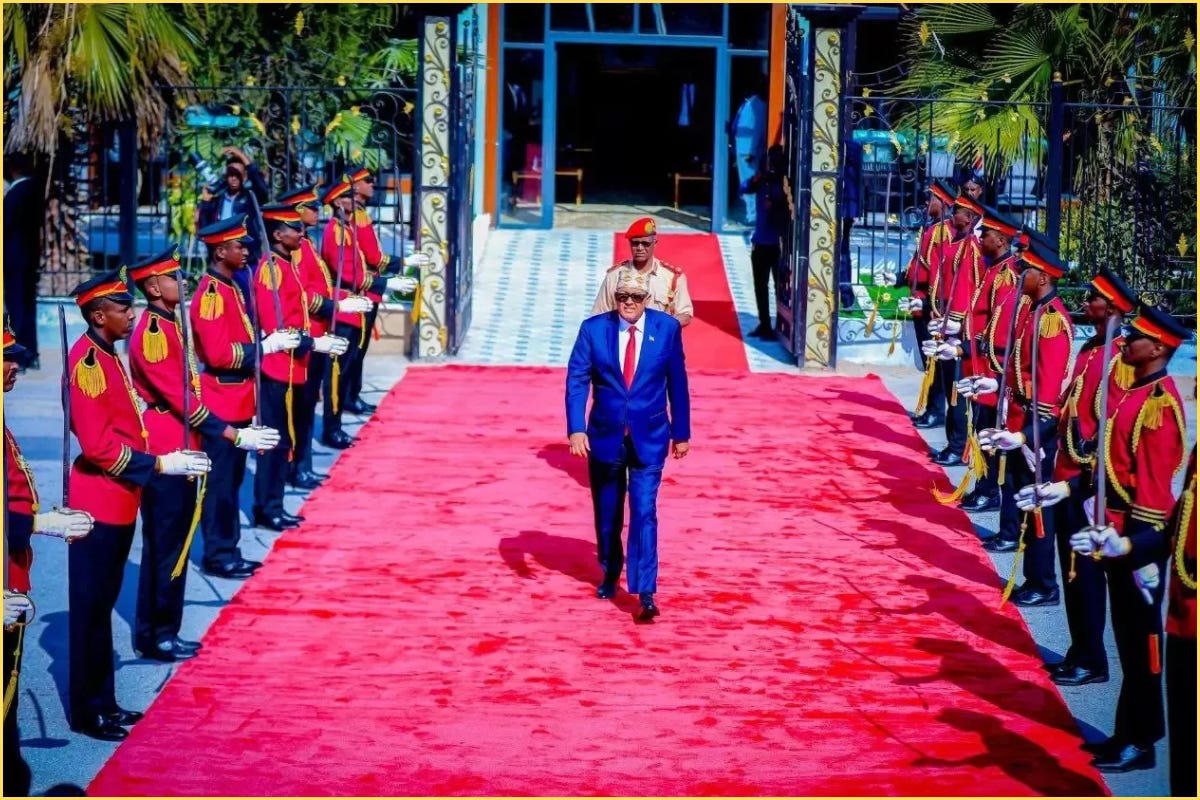
For Somaliland, still unrecognized and struggling for legitimacy, this partnership is survival. It trades access and autonomy for investment and diplomatic attention, letting Abu Dhabi turn a sovereignty vacuum into leverage. Modern empire doesn’t rely on conquest anymore, it runs on contracts, cargo, and plausible deniability.
Puntland and Somaliland act as areas through which the UAE can expand its influence. Because they are self-governing and outside Mogadishu’s full control, the UAE can use them as buffers and logistics zones, effectively letting it counter rivals (like Turkey and Qatar) and manage covert shipments without direct interference from Somalia’s federal government. This arrangement allows Abu Dhabi to bypass UN embargoes, using Bosaso and, possibly, Berbera as staging points for arms shipments to the RSF.
This proxy dynamic came into sharper focus last month, when Puntland and Somaliland, who were actually rivals over disputed territories like Sool and Sanaag, signed a rare cooperation pact in Nairobi. The agreement, framed as a boost to trade, freedom of movement, and anti-terrorism efforts, includes coordinated border patrols and joint security operations. But the real driver was the rise and success of the SSC-Khaatumo movement (Dhulbahante clan’s self-declared Northeastern State), which expelled Somaliland forces from Lascanood in 2023 and formally aligned with Mogadishu in July as a new federal member state. This Northeastern State of Somalia, threatens both breakaway entities by legitimizing federal influence in their claimed borderlands, potentially opening the door to Turkish and Qatari-backed interventions that the UAE opposes.
This is how a new Somali federal state is quietly dismantling Hargeisa’s dream of recognition:
firdhiye’s election and the collapse of somaliland’s independence narrative
For decades, Somaliland has presented itself as the exception in the Horn of Africa, a territory that broke away from Somalia in 1991 and built the facade of a stable, functioning democratic state wh…
For Deni and Somaliland President Abdirahman Mohamed Abdullahi (Irro), the pact is a pragmatic realignment to unite against a common foe to preserve autonomy and UAE-backed economic lifelines. UAE mediation is implicit. Abu Dhabi gains a stabilized Gulf of Aden corridor, ensuring uninterrupted RSF resupply and broader Red Sea/Gulf of Aden control without more Somali federal interference.
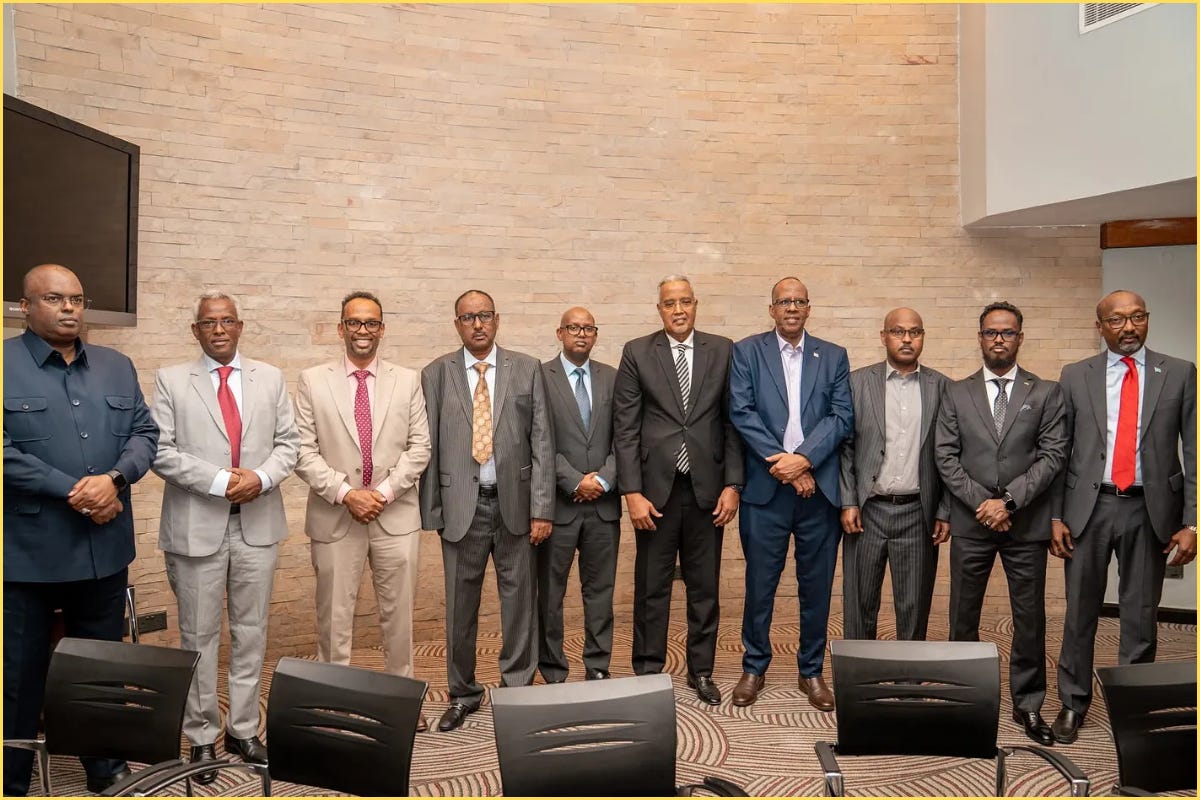
The flights follow a pattern. Il-76s from Kyrgyz operators like Skyline and Fly Sky, fronts for UAE logistics, handle the Bosaso-Kufra corridor, carrying up to 40 tons per load. Heavier Boeing 747s, like Moldova’s ER-MDR (operated by Pecotox Air), fly direct from UAE bases to Benghazi, offloading to Khalifa Haftar’s Libyan National Army (LNA). Haftar, another UAE proxy, controls eastern Libya. He facilities overland transfers to RSF-held Darfur.
to the horn and beyond
From Bosaso to Berbera to Kufra, the pattern is unmistakable. The UAE has assembled a transnational logistics regime with planes, bases, and private contractors sustaining wars that blur the line between state and enterprise. In many ways, it resembles a modern Dutch East India Company: a profit‑driven network that merges trade, militarism, and private interests to build a 21st‑century pirate empire, the first to make such a model succeed in the new age.
The Emirati model functions through jurisdictional gray zones. Semi-autonomous regions like Puntland and Somaliland, fractured governments like Sudan and Libya, pliant allies like South Sudan and Chad. In each, Abu Dhabi trades money and protection for access. Instead of a traditional empire, the UAE builds a network of dependent states that look independent but rely on it for money and protection.
Khartoum has not remained silent. Sudan’s government has formally accused Puntland of facilitating the flow of arms and mercenaries, lodged official complaints with Mogadishu, and sent its intelligence chief, Lt-Gen Ahmed Ibrahim Ali Mufaddal, to the Somali capital back in August to demand action against UAE-linked flights and mercenary pipelines.
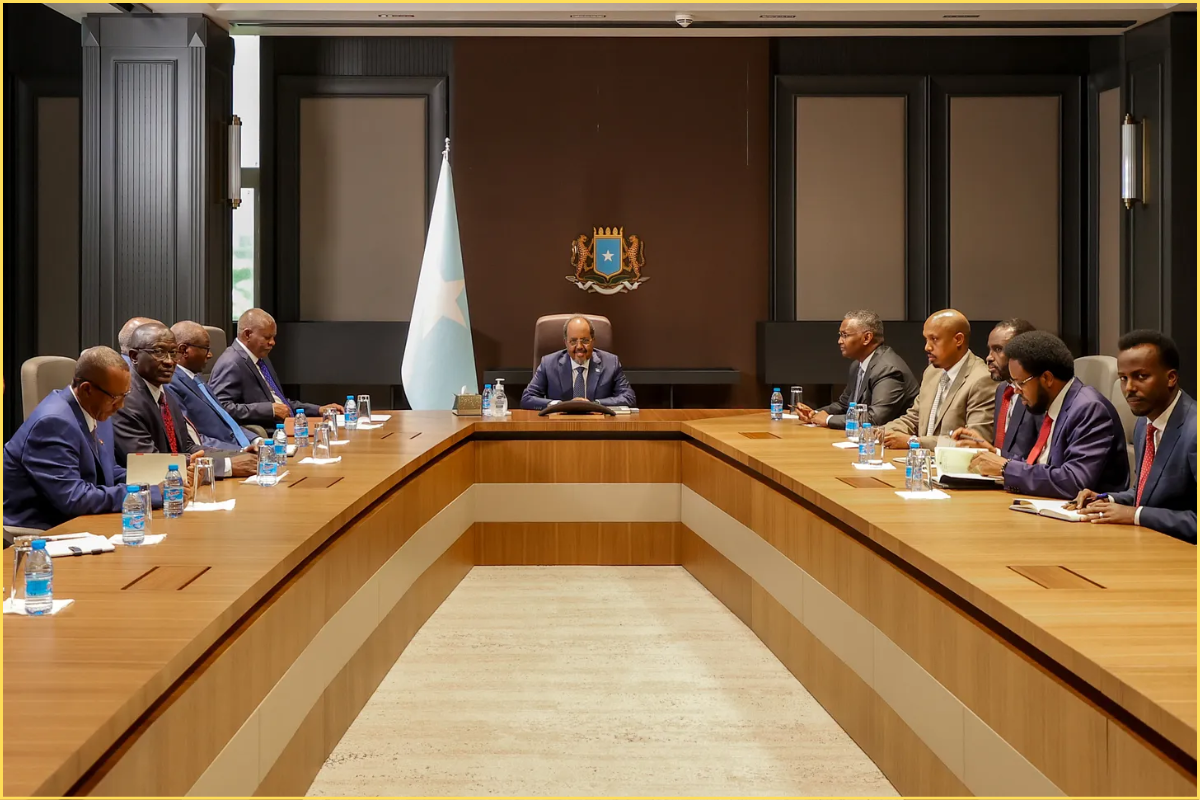
Yet the federal Somali government has responded cautiously. On Wednesday (11/5), Defense Minister Ahmed Moalim Fiqi appeared before the upper house of parliament and confirmed that cargo flights from Bosaso to Sudan do occur. He offered no detailed schedule or inspection plan, and stated that Mogadishu has no verified information on what is inside the shipments.
The government acknowledged the accusations as “serious” and promising to “review” them, but taking no visible enforcement steps, such as inspecting Bosaso or banning overflights, while a UAE delegation arrived in Mogadishu the very next day (after Sudan’s intelligence chief left). Officials in Mogadishu have emphasized ongoing “diplomatic consultations,” balancing their ties with Abu Dhabi against Sudan’s anger.
This inertia stems from Somali Federal Government’s deep economic reliance on the UAE. Despite being a Turkish-Qatari “ally” (with Ankara training Somali forces and Doha mediating federal-state disputes), Mogadishu benefits from hundreds of millions in UAE debt relief, millions in port and infrastructure investments, and security aid that bolsters recovery from decades of conflict, making confrontation with Abu Dhabi a non-starter.
Sudan has warned that if the corridor continues to fuel RSF operations, it will consider external sponsors complicit. A message aimed as much at Puntland as at the Gulf backers behind it. The RSF’s atrocities in Darfur and the militarization of Puntland are all extensions of the same system. Each flight departing Bosaso does more than carry weapons, it reinforces a regional system where conflicts are driven by private interests, contractors, and proxy forces, creating a self-sustaining order built on profit and influence rather than governance or stability.
empire by contract
What’s clear from the UAE’s actions in Africa is that its influence doesn’t come from wars or invasions but from business deals. Instead of conquering land, it builds power through contracts. Working with logistics companies, private security forces, and port operators, so that control comes through money and trade, not just fighting on battlefields.
Haftar in Libya, Hemedti in Sudan, Deni in Puntland, Irro in Somaliland, and Hassan Sheikh in Mogadishu all lean on Abu Dhabi’s patronage, each for different reasons. Haftar depends on Emirati weapons and funding to sustain his hold over eastern Libya; Hemedti relies on UAE arms and gold trade links to finance his RSF; Deni counts on Emirati cash to bankroll Puntland’s security forces; Irro seeks investment and recognition for Somaliland’s unrecognized state; and Hassan Sheikh needs debt relief and security aid. Together, they illustrate how the UAE buys influence through tailored incentives rather than force. In exchange, they surrender slices of sovereignty: land for bases, airspace for overflights, ports for concessions, money for silence and complicity. Haftar gets drones to hold Benghazi; Hemedti, arms to seize Darfur’s gold; Deni, cash to fund his personal army. The pattern repeats, turning leaders into middlemen.
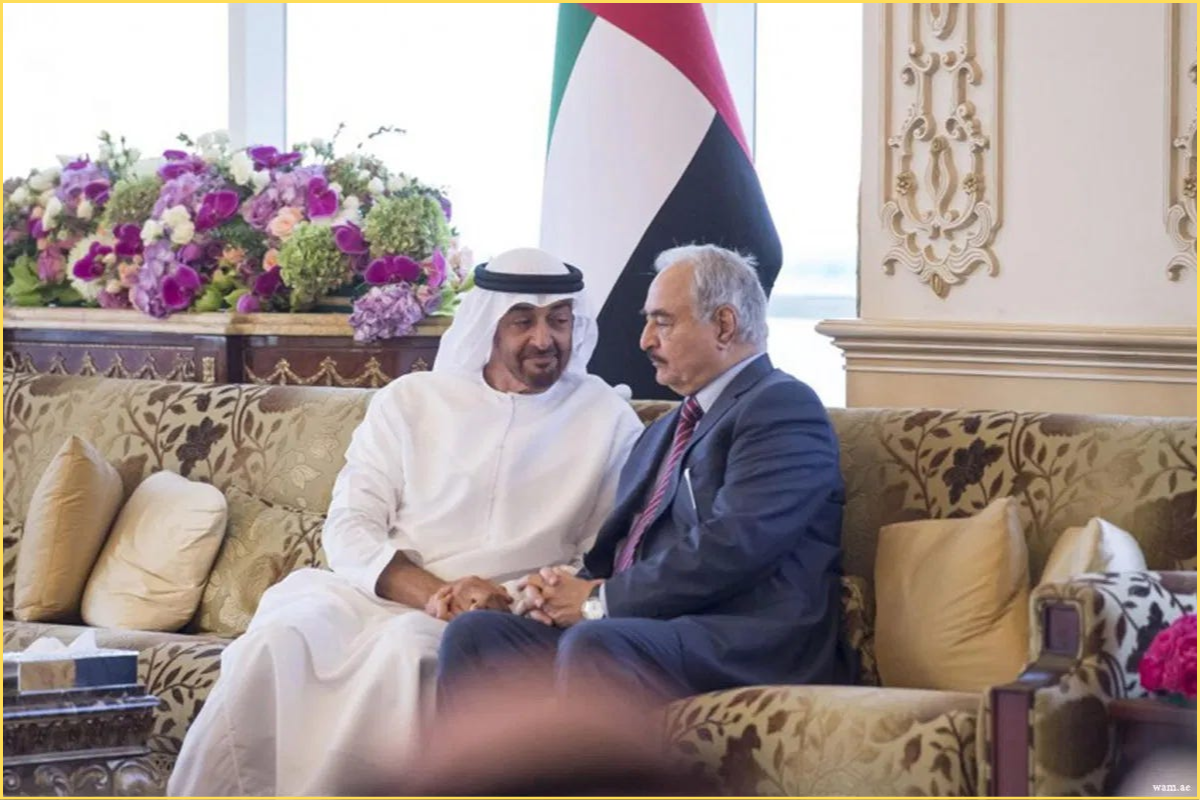
For the UAE, it’s ruthlessly efficient. A web that extends power across the Red Sea and Sahel without the weight of occupation or the glare of accountability. No troops to deploy, and no colonies to defend, just investments that lock in loyalty. For the states entangled, it’s a slow erosion (While their leaders get rich! for example, Deni secretly pocketed $20 million from the UAE for oil blocks and Garacad Port). Chad learned this the hard way, hosting UAE flights through Amdjarass until UN scrutiny forced a pivot, only to see the relationship morph into quieter economic ties. (Chad’s President Mahamat Idriss Déby touched down in Abu Dhabi this week with a 200-strong delegation, publicly begging for $30 billion in “development” funds to keep his regime afloat.)
The Il-76s flying over the Horn, the Colombian mercenaries shuttled to Darfur’s front lines, the discreet pacts in Nairobi, they’re all cogs in the same apparatus. A system where fragile nations trade their futures for sponsorship, and Abu Dhabi converts petrodollars into puppet strings, orchestrating conflicts without pulling a trigger. In the end, it’s the people of Sudan who pay the blood price, while the architects count their gains from afar.
Boycott the UAE.
Don’t go to Dubai.



